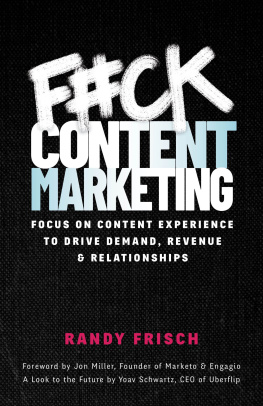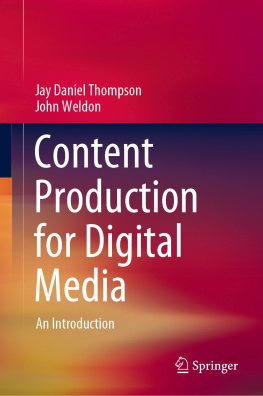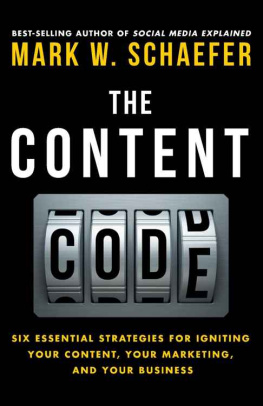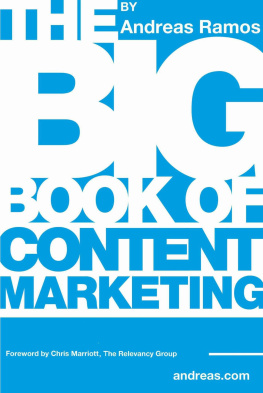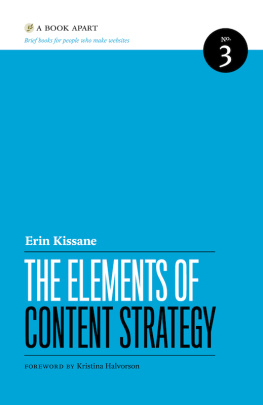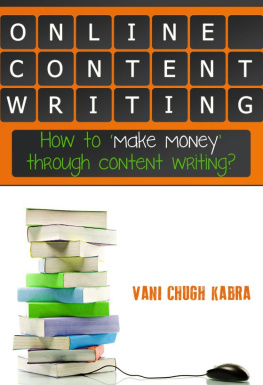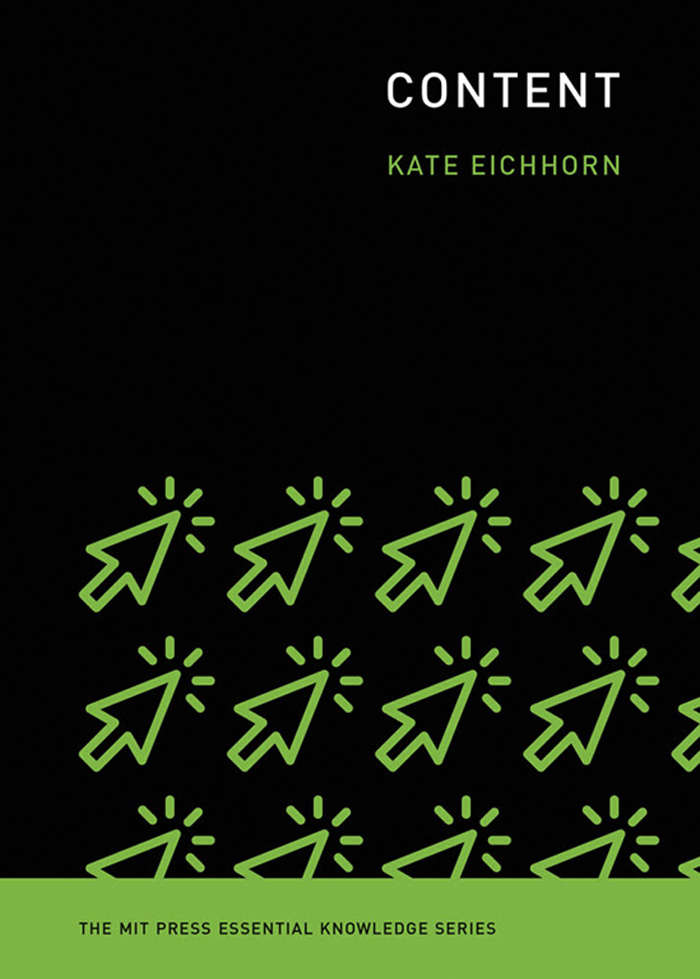
Content
The MIT Press Essential Knowledge series
A complete list of the titles in this series appears at the back of this book.
Content
Kate Eichhorn
The MIT Press | Cambridge, Massachusetts | London, England
2022 The Massachusetts Institute of Technology
All rights reserved. No part of this book may be reproduced in any form by any electronic or mechanical means (including photocopying, recording, or information storage and retrieval) without permission in writing from the publisher.
The MIT Press would like to thank the anonymous peer reviewers who provided comments on drafts of this book. The generous work of academic experts is essential for establishing the authority and quality of our publications. We acknowledge with gratitude the contributions of these otherwise uncredited readers.
This book was set in Chaparral Pro by New Best-set Typesetters Ltd.
Library of Congress Cataloging-in-Publication Data
Names: Eichhorn, Kate, 1971- author.
Title: Content / Kate Eichhorn.
Description: Cambridge : The MIT Press, 2022. | Series: The MIT press essential knowledge series | Includes bibliographical references and index.
Identifiers: LCCN 2021000773 | ISBN 9780262543286 (paperback)
Subjects: LCSH: Information services industry. | Online social networks. | Search engines. | InternetSocial aspects. | InternetPsychological aspects. | Information technologyPsychological aspects.
Classification: LCC HD9999.I492 E33 2022 | DDC 302.2/402854678dc23
LC record available at https://lccn.loc.gov/2021000773
10 9 8 7 6 5 4 3 2 1
d_r0
Contents
Series Foreword
The MIT Press Essential Knowledge series offers accessible, concise, beautifully produced pocket-size books on topics of current interest. Written by leading thinkers, the books in this series deliver expert overviews of subjects that range from the cultural and the historical to the scientific and the technical.
In this era of instant information gratification, we have ready access to opinions, rationalizations, and superficial descriptions. Much harder to come by is the foundational knowledge that informs a principled understanding of the world. Essential Knowledge books fill that need. Synthesizing specialized subject matter for nonspecialists and engaging critical topics through fundamentals, each of these compact volumes offers readers a point of access to complex ideas.
Preface
When nearly everyone in the United States and around the world was being asked to shelter in place at the start of the COVID-19 pandemic in April 2020, Floridas governor Ron DeSantis held a press conference to address what he perceived to be a serious problemthe lack of new content. People have been starved for content, he said. We havent had a lot of new content since the beginning of March... we need to support content, especially sports. On this basis, DeSantis declared that alongside medical personnel and employees working at pharmacies and grocery stores, employees of professional sports and media production companies could return to work and start producing new content.
To rationalize his positioning of content as an essential service, DeSantis appealed to both history and psychology. First, he observed, Weve never had a period like this in modern American history where youve had such little new content, particularly in the sporting realm. I mean, people are watching, were watching, like, reruns from the early 2000s, watching Tom Brady do the Super Bowl then. Second, he speculated, content might ease the pain of people who are chomping at the bit, and even have a positive psychological impact: To be able to have some light at the end of the tunnel... see that things may get back on a better courseI think from just a psychological perspective I think is a good thing. While DeSantiss press conference garnered considerable attention, his claims provoked many questions.
DeSantis didnt define modern American history, but even if he were referencing a relatively short periodlets say, 2010 to 2020his statement about the unprecedented lack of content in the midst of the COVID-19 lockdown was certainly false. By all accounts, were producing much more content now than we were just a few years ago, so even a significant disruption in content production would be unlikely to leave us with less new content than any other time in modern American history. By one estimate, as of 2020, the world was producing 44 zettabytes of data (or 1,0007 bytes) annuallyan estimated ten times the amount of data we were turning out in 2013.
However, DeSantis didnt simply claim that we were witnessing an unprecedented decline in content. He also claimed that content should be viewed as an essential servicesomething vital to Floridians health and wellnessfor psychological reasons. At least some Florida residents and businesses appeared to agree with him on this. The World Wrestling Federation (WWF), which records its Monday Night Raw programs from a studio in Orlando, even echoed the governors suggestion that new content would have a positive psychological impact. As one WWF spokesperson echoed, WWF and its Superstars bring families together and deliver a sense of hope, determination and perseverance.
As someone who happened to be finishing a book about content at the time of DeSantiss press conference, I was also left with a few additional questions. How could DeSantis claim that weve never before had a period of modern history with so little content when the concept of content is itself relatively recent? What turn of events had led an elected government official to view content production as essentialsomething essential enough to be prioritized alongside access to food or health services? And how could something so ambiguously defined and misunderstood be positioned as vital to our ability to carry on in the face of adversity?
DeSantiss press conference may have been one of the more absurd episodes to unfold on the political stage during the COVID-19 crisis, but for the purposes of this book, it is by no means insignificant. While he was certainly wrong to conclude that weve never had a period like this in modern American history and likely wrong to argue a positive correlation between new content and psychological wellbeing, he may have gotten one thing rightin our content-rich world, there at least appears to be a constant demand for new content.
We no longer live in a world where newspapers arrive on our doorstep once a day. Many people now expect news updates all day long. Likewise, television isnt something we tune in to on certain days of the week at certain times to watch certain episodes. Many people expect to have access to new content on streaming platforms like Netflix and Hulu on a constant basis. The same holds true for the content we produce ourselves. Imagine how disconcerted we would be to wake up and log on to Facebook, Twitter, or Instagram and find not a single new update. After all, absent a truly apocalyptic event, when would we ever wake up and find no new content posted on our social media accounts? Like it or not, content has become an integral part of our lives. Many people even expect new content 24/7 and 365 days of the year. But what exactly is content? Who produces it? Why and how did it come to be viewed as essential? And how will content continue to structure our economy, culture, politics, and everyday lives in the future? These are the questions this book explores and, where possible, answers.
Like any book, this one is the result of many conversations carried out over a period of several years. First, Im grateful to J.K. who shared with me his expertise on search engine optimization and web entrepreneurship, and eventually, his moral and ethical reservations about the content industry. Without his insights, this book never would have been written. I also wish to thank media historian Craig Robertson who invited me to participate on a panel about the concept of information at a meeting of the Society of Cinema and Media Studies in 2018. On the panel, I noticed that although the term
Next page

